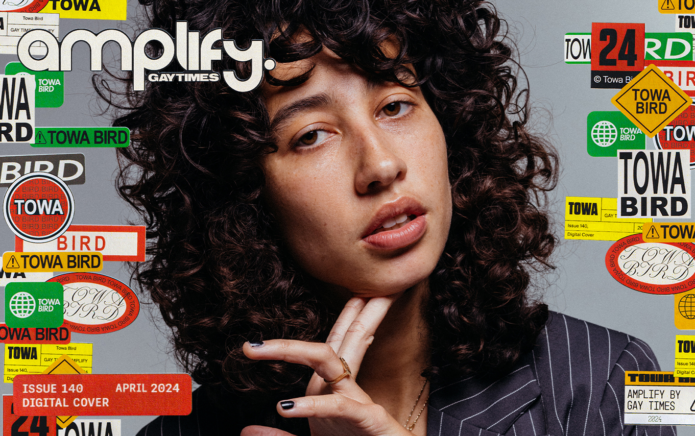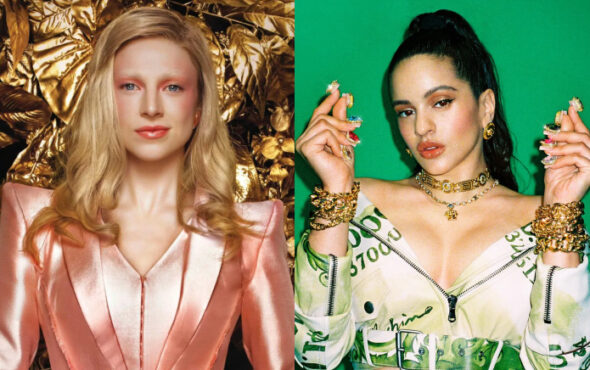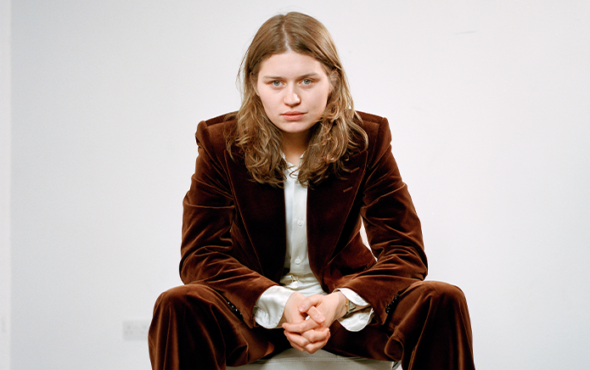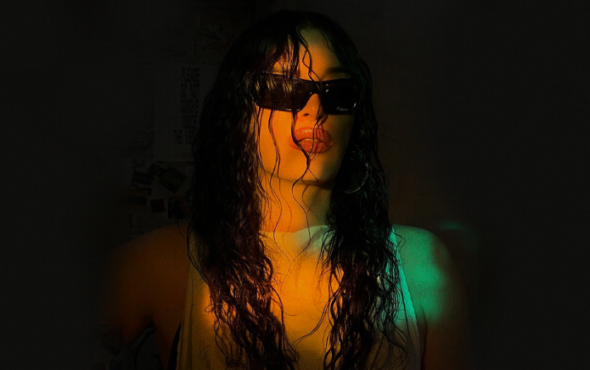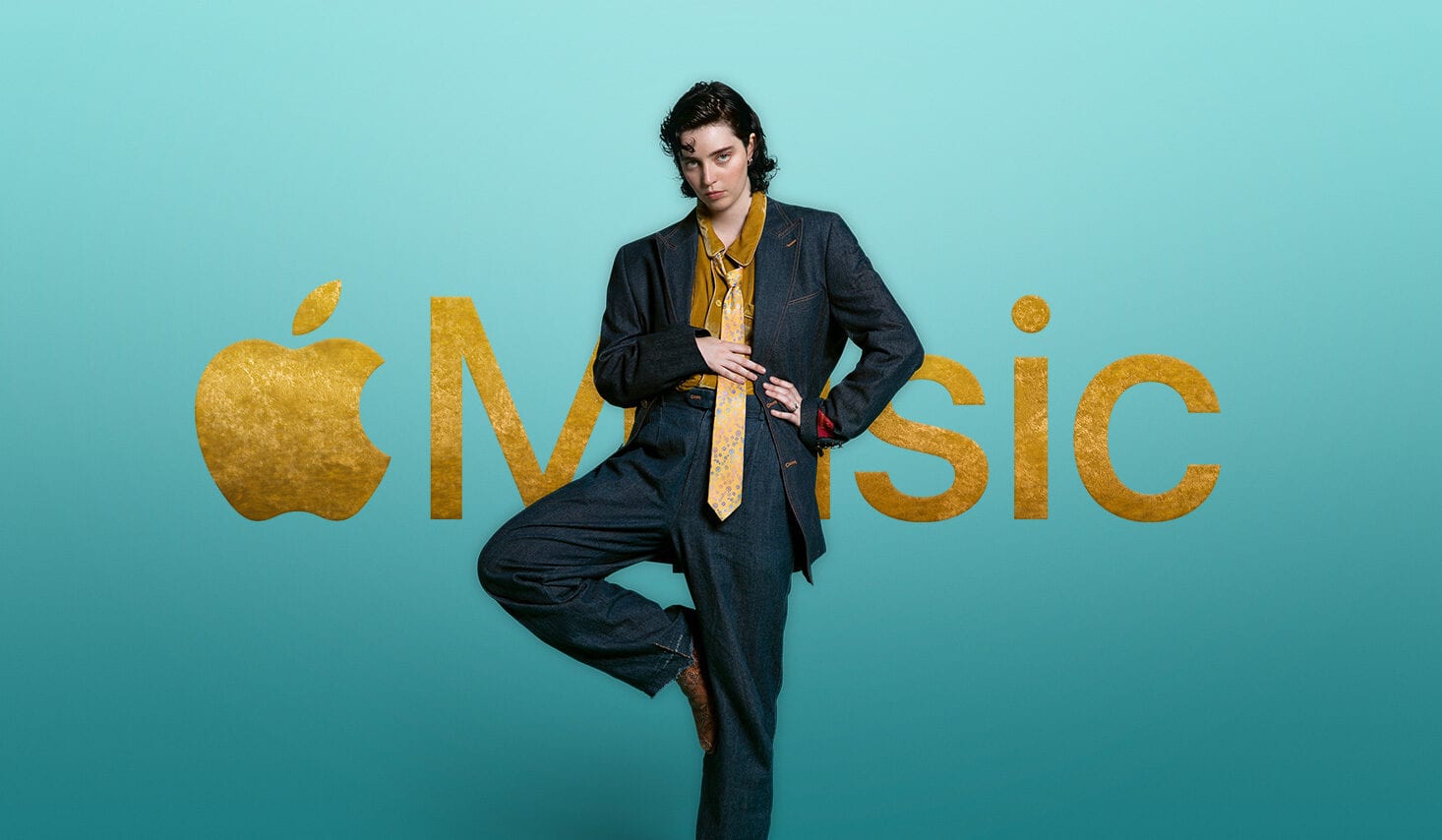
Elton John. Frank Ocean. Freddie Mercury. Dusty Springfield. There’s a strong tradition of LGBTQ+ music acts creating stage personas and going on to change the cultural landscape. Adopting a new moniker allows you to create a whole new identity, or simply present an enhanced version of the person you already are. For Gia Ford – who is known as Molly McCormick to her family and friends – it was very much the latter. “It was a really weird process, as I wanted to have a stage name because I wanted to have an elevated version of myself,” Gia tells us as she sits down for her interview as GAY TIMES and Apple Music’s latest ELEVATE artist. “I wanted to play on that persona and give whatever I’m writing this fictional character, even though it’s still me.”
It’s a concept that has served the Sheffield-born singer-songwriter well. After spending three years developing her sound, Gia released her debut EP, Poster Boy, last October. Songs like Turbo Dreams, Girl, and High Class Tragedy offered a smooth blend of dreamy pop, slick grooves and moments of elation. This suave pin-up persona she embraced was working its magic. For its follow-up, however, Gia took an unexpected turn.
Murder In The Dark – which its title clearly hints at – was much darker in tone, resulting in a more sophisticated sound for Gia. “I think people were shocked by it, but I’ve had a lot of good responses,” she says. “I think people didn’t know that was the direction I’d go in, because it was very bright and pop to begin with – and quite romantic. But then this big, dark shift happened and people weren’t expecting it. One review said it was like a ‘camp horror show’ and I thought that was perfect.”
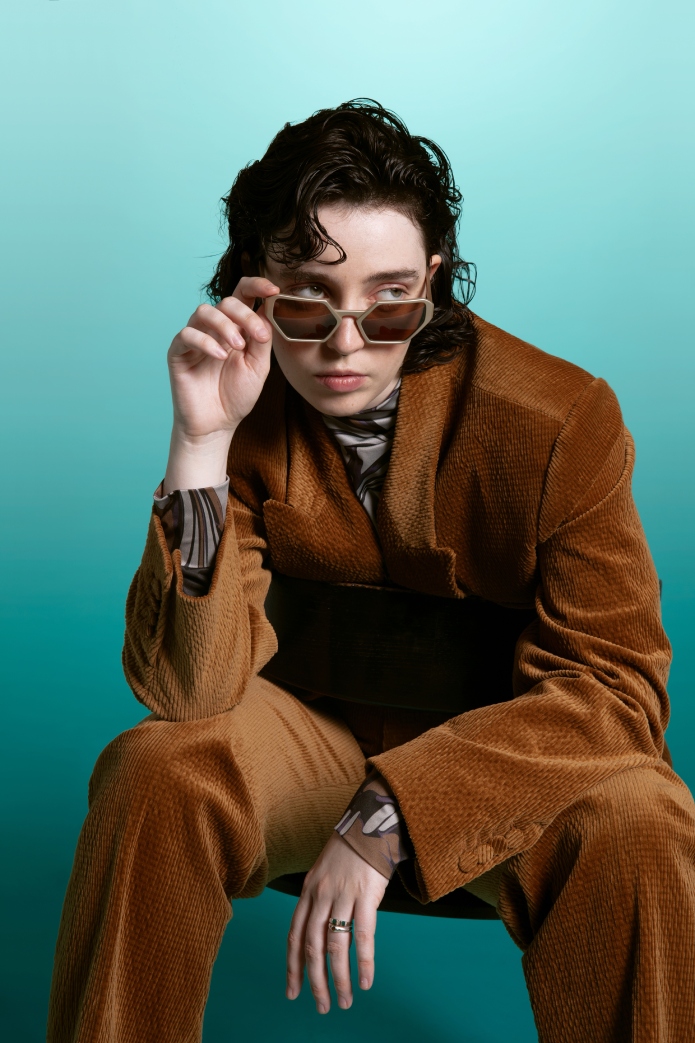
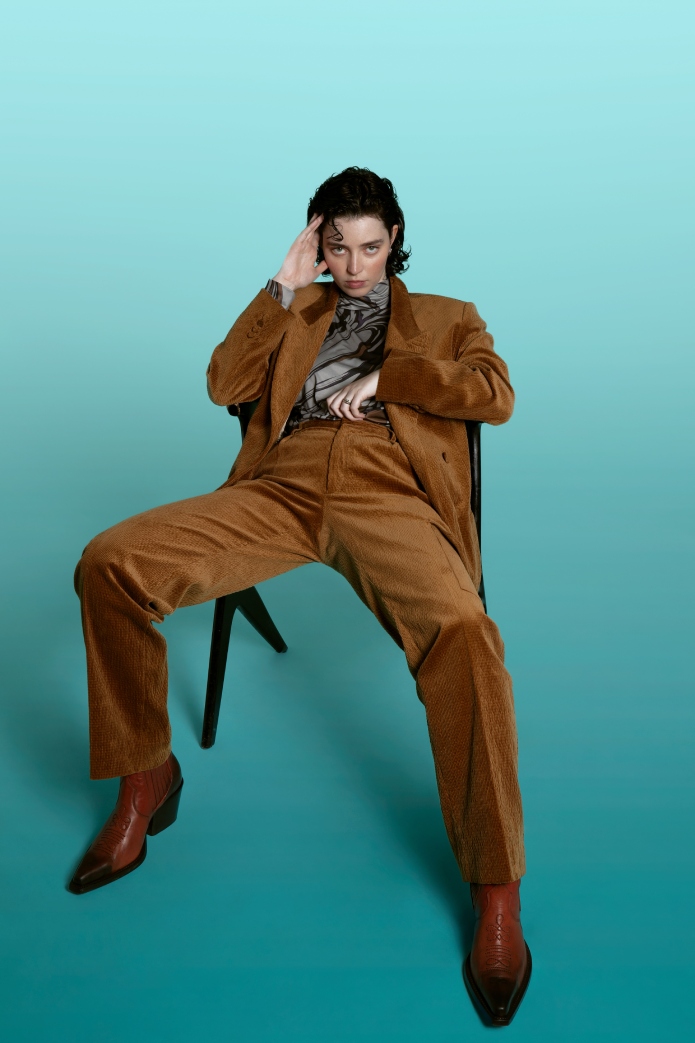
If you haven’t yet caught the jist, just know that Gia’s music is very much grounded in character-driven storytelling. ‘Cinematic’ is a word that’s followed her music around since her debut, and it’s easy to hear why. Murder In The Dark is brimming with so much atmosphere it could be categorised as a VR experience. The music places you firmly in the centre of the story – and there’s a good reason for that. “My writing process is quite a visual process, and what I mean by that is when I start writing a song I have a scene in mind, and I want to saturate that image and paint it through sound,” Gia explains. “I’ll get obsessed with certain things, and then want to write a collection of songs that reflects both things and all of the nuanced visuals that are in those worlds that I’m in. I just get obsessed with feelings and scenes and movies.”
This fictional approach to storytelling is prevalent throughout most of Gia’s music. “I find it quite tiring to write about myself all the time,” she admits, adding that most of her songwriting comes from an observational rather than a personal perspective. “I don’t want to be too introspective because looking into yourself all the time is very tiring and unnecessary. A lot of the time it’s from fictional books or experiences. I don’t tend to create my own fictional characters, but it’s definitely something I’ll look into. It all ties in together, and sometimes my girlfriend will have a visual reference for a photoshoot we do, and it’s from a movie, and then I’ll watch that movie, so it’s a scattered process. A lot of it is building my own world around something that already exists. I get to have an insight into other worlds and other people’s lives and surroundings and emotions.”
Despite looking beyond her own experiences for inspiration, there’s an inherent queerness to Gia’s visuals and music. Her identity and gender expression permeates through the storytelling, so I ask if it was ever a question that she wouldn’t be open about who she is when starting out in the music industry. “It’s never a talking point for me,” she says. “It’s who I am and if someone wants to ask me about it, I’ll talk about it. I’m one of those people who will talk about the importance of being open with yourself and being completely true to yourself, and I live by that. I never came into music and thought ‘I’m going to sing about a girl, because then all the lesbians will…’ it was never like that, it’s just my truth, and I’m living how I would anyway if I wasn’t an artist.”
I’m one of those people who will talk about the importance of being open with yourself and being completely true to yourself, and I live by that.
Gia adds that her identity is not something that is constantly at the forefront of her mind. She just happens to be attracted to women. But that’s not to say that she isn’t engaged when it comes to LGBTQ+ issues that affects the community, or tackling widespread discrimination. “The only time it came up in relation to my career was when I started doing visuals with my girlfriend,” she says. “And there are ways of presenting yourself that people will deem as ‘more queer’ which is ridiculous, because it’s just how you are; but that’s the only time I thought about it, that people saw me and they knew. But in terms of the music, I’ve always written about a girl I’ve been with, and that’s how it is.”
All that being said, Gia does appreciate how being open as a queer musician does impact younger fans positively, and positions her as someone they would look up to. “It wasn’t the plan, but it’s very nice,” she says. “I didn’t have that when I was kid, and it’s not something I consciously thought I didn’t have, but now it’s being spoken about more online about what we miss as queer people in terms of representation in the media. I didn’t realise that until everyone was talking about it, and I was like ‘Oh shit, I didn’t have anyone that I could look up to.’”
When I ask Gia about the first instance that she felt like she saw herself represented in mainstream media growing up, she credits Naya Rivera’s portrayal of Santana Lopez in Glee. We’re speaking little over a week after Naya’s tragic passing, and Gia admits that the news “hit [her] harder” than she thought it would. “Looking back, I would come home from school and my mum and I would watch Glee together,” she says. “Santana was a fully-fledged character with her good side and bad side, and she was a human being, whose feelings were taken into account at every stage. So it was there that I first saw a queer character that was written with every aspect of a human being in mind, and I appreciate what she did. I learned the other day, after her passing, that the lesbian character was written as one-note, and Naya said ‘No, if we’re going to do it, we’re going full on, and write her a whole persona.’ So, she really pushed that to happen.”
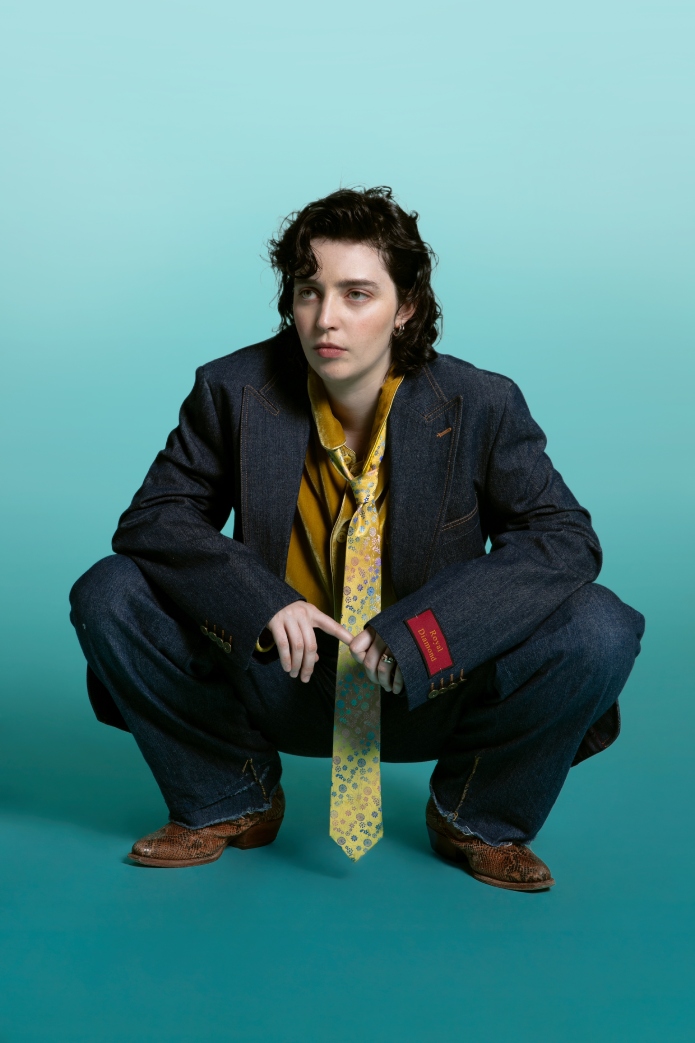
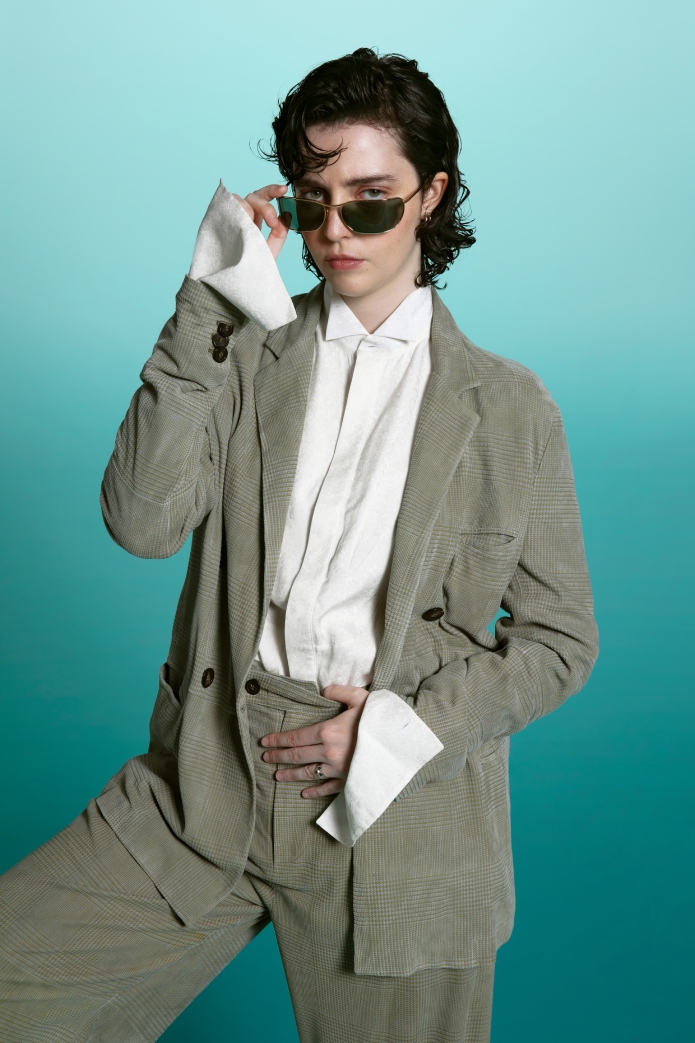
Out of the eight ELEVATE artists that GAY TIMES and Apple Music has championed so far, Gia will be the fifth queer female act. It’s proof that queer female talent is producing some of the most exciting and innovative music right now. “I’m a big believer that social media has changed the landscape drastically, as it allows people to tell their stories and put themselves out into the world unapologetically,” Gia says when I pose the question as to where this explosion of brilliant queer female talent has come from. “I think the media has to reflect that, the industry has to reflect that. As queer people, we’re creating our own space online, and it’s as inclusive as a space will be. I think social media has changed that, and it may be the sole reason that we’re seeing such a boom in queer female artists, as we have power we’ve never had before. I definitely am grateful that I was born into this era and can be unapologetic about my gender and sexuality.”
But while queer females are experiencing more reach and success than ever before, women overall within the music industry still face greater challenges than their male counterparts. Gender inequality is rife, whether its female musicians constantly having to reinvent themselves, being overly sexualised for the straight male gaze, not being booked as headliners at festivals, or being unfairly judged on looks. “I think you also have to be way less mediocre,” says Gia. “I don’t want to sound bitchy, but there are so many mediocre male bands, but because it’s three white guys that everyone fancies, it’s fine. I think you have to work ten times harder, and that’s only as me as a white, cis female. It’s much harder for everyone more marginalised than I am.”
So how do we start to dismantle this unequal system? “I think it’s just being brave enough to change the pattern,” Gia says. “To understand what you’re perpetuating by not changing your behaviour, like a label not hiring women or people of colour. It’s also being aware of the fact there’s such systemic inequality and do you want to be on the right side of history or not? Do you want to feed into that, or change it? It starts with you. It’s about intersectionality, it’s about understanding how this world treats people and it’s about the behind-the-scenes.
“I’m a big believer that social media has changed the landscape drastically, as it allows people to tell their stories and put themselves out into the world unapologetically.”
“Obviously, the music industry is run by a lot of women of colour – as in the artists – but what people need to understand is that it’s performative. You can see a label from the outside being vibrant and multicultural, but then it’s run by white men, so it’s about diversifying at every level and keeping that going and making it your mantra and not forgetting it. We keep sharing this information about how the industry is run, how they’re represented, what people are expected to do – especially women – so we need to look head-on at the problems. I think the music industry hides behind the veil of being perfect. The music industry needs to reflect the world around it, and so long as it only reflects a small group of society, we’re never going to be able to tell the stories we truly want to tell, and it’ll never be inclusive enough. It’s making sure that you move through your life and consider every other person other than yourself, and that applies to everything, not just the music industry.”
At 23 years old, Gia Ford is an artist with her feet firmly on the ground and a razor-sharp focus on her creative vision. She’s just gone independent and is navigating both the artistic freedom and challenges that poses. The music, she promises, is going to get darker yet. “I’m always attracted to that sort of sound,” she adds. “I wanted to make it not sad, but more evocative of powerful emotions. I’m going a little more classic in that sense, and try to track it live, having more real instrumentation with it.”
The heavier guitar strums on new track Sleeping in Your Garden with its pounding drum-kick and earthy vocals delivers on that promise and then some. It’s an electrifying turn from Gia. In a post-COVID world there will be more tour dates to support this music, and you can already feel the rumble of the venue when this track starts to build to its powerful conclusion. The story of Gia Ford is still in its infancy, but she is already showing signs of being an artist that will keep us on our toes. And that’s what the very best in music continually do. With a fast-growing loyal following and plenty of early buzz, we suspect it won’t be too long until another queer artist with a timeless stage name will join the ranks of those who paved the way before her.
